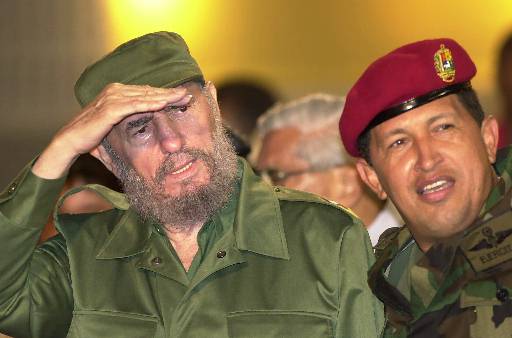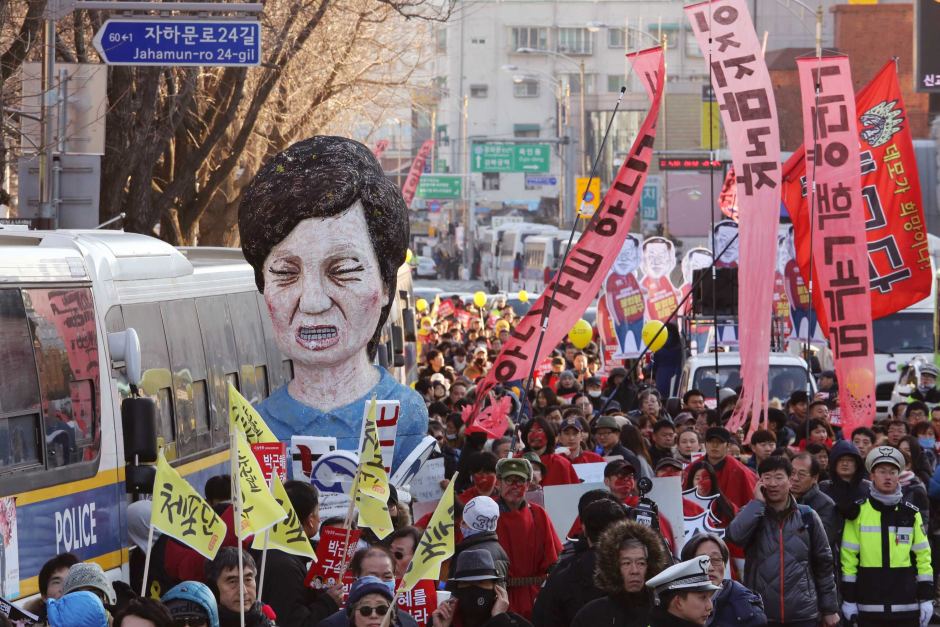By: Marco Roca
With the closing of the October 7 election, Venezuelan President Hugo Chávez reveled in the news that he would be serving an unprecedented third term. However, not everyone in Venezuela shared in the joy of the re-elected commander-in-chief. Many believe that Venezuela is on the verge of a revolution, as the rich are losing many of their holdings or leaving the country altogether. The departure of much of the country’s wealth has obviously caused serious economic strain and turmoil. While this is has been an ongoing process since Chávez’s first inauguration in February 1999, Venezuela is becoming more like Cuba each day.
As always, the two countries’ leadership is a good place to start conducting an effective comparison. Picture Chávez next to Fidel Castro, Cuba’s long-standing ex-president and current Prime Minister; the resemblance is undeniable. Castro came to national prominence in Cuba when he led the unsuccessful Moncada Barracks Attacks in July 1953. Similarly, Chávez achieved his “glory” when he directed a failed coup d’état in February of 1992. After their failed raids, both Castro and Chávez were imprisoned for a short period of time before assuming national power. Just as Fidel Castro set up his brother, Raul Castro, in several positions of Cuban power (the most recent being the presidency), Hugo Chávez has set up his brother, Adan Chávez, in several political posts as well. Although Adan is now both Hugo’s chief of staff and chief Marxist consultant, it is worth noting that Adan was originally the Venezuelan ambassador to Cuba, clearly depicting where Venezuela’s foreign policy priorities lie. Chávez frequently refers to Castro as his mentor and the mastermind behind the “revolutionary democracy” found in Cuba. In an effort to become more like his seasoned chum, Chávez has recently been pushing the Venezuelan congress to let him run for an indefinite presidential post.
For all of their similarities, one important difference to denote between the two leaders is that Chávez has the advantage of democratic legitimacy. This magnificent boon to the Chávez regime stems from fair and accessible Venezuelan elections. Therefore, no matter how many times Chávez claims that, “Venezuela is traveling towards the same sea as the Cuban people, a sea of happiness and of real social justice and peace,” the United States will have a hard time reverting to the Truman Doctrine.
While a strong bond between two heads of government tends to bring countries closer together, the relationship between Cuba and Venezuela stretches far beyond their notorious leaders. The two Latin American countries have developed an amiable partnership, forming joint business ventures, conducting large financial transactions, exchanging technologies, and working together on intelligence and military matters. Venezuela has found reassurance in Cuba’s experience with communist policies, and Cuba has helped Venezuela design systems such as Misión Mercal, which provides subsidies for food and basic essentials, and the Venezuelan medical system. The latter serves as an encapsulating microcosm of the symbiotic relationship, in which Venezuela gives Cuba discounted oil in exchange for well-trained Cuban doctors. Despite his myopia about keeping Venezuela self-reliant, Chávez actually went to Cuba to have his malignant cancer tumors removed.
Geographical circumstances alone cause major discrepancies in government structures, Venezuela being over twice the size of California with one of the world’s largest oil reserves, while Cuba stands as an impoverished Caribbean island nation. Either way, both countries have nationalized or, as in Venezuela’s case, are nationalizing their country’s largest businesses and suppliers of goods and services. Since Venezuela is “filthy rich” in oil reserves, it has been able to provide its people with gas for $.09 a gallon. Through Misión Barrio Adentro (Inside Neighborhood Mission), 40 percent of Venezuelans receive medical care (largely provided by Cuban doctors) completely free of charge.
Regardless of how much the Venezuelan masses may enjoy these benefits and countless others, the oil reserves do not begin to cover the price tag, and the status quo is unsustainable. Although Venezuela suffers the world’s greatest gap between rich and poor, the answer is not to take excessively from the fortunate few. Chávez has progressively limited the earning potential of and the motivation for the rich to live in Venezuela at all. Venezuela came dead last (183rd out of 183) in the 2011 world ranking of international property rights, and the government has set so many rules as to how much profit a company is allowed to enjoy, that Venezuela came in at 172nd out of 183 (after war-torn Afghanistan and Iraq) in the World Bank’s 2011 “Doing Business Report.” Monetary stability has followed suit in decay, and it is now impossible to trade bolivars for dollars. As The Real Deal first reported, Venezuelans are coming to the Miami real estate market in droves. This is largely due to the so-called “Chávez effect,” or wealthy Venezuelans’ concerns over the economic policies of their president.
The United States may find it has a new communist force to reckon with in the near future. However, Venezuela is the United States’ fourth largest supplier of foreign crude oil, and Venezuela is thus essential to the American economy. Combined with the fact Chávez still maintains democratic legitimacy, it is not only unlikely, but almost impossible that the United States will ever place an embargo on Venezuela. This allows Venezuela the funding and infiltration power Cuba only ever dreamed of.
The question remains: is a revolution really upon Venezuela? The statistics indubitably color that reality, as violence in Venezuela has spiked recently, with more than an 11 percent increase from the same period in 2011. With Chávez’s recent re-election, the nature of the violence is increasingly politically charged. Reflective of violence in the Cuban Revolution from 1953 to 1959, the rich are fleeing for economic and personal safety reasons, leaving an industrial hole in Venezuela. Even though this was slated to be a closely contested election, it may be the last of its kind in Venezuela. This unfortunate reality will continue to prevail, as those who stand to lose from Chávez’ policies will continue to depart at alarming rates. With many of Venezuela’s elites carrying on as expatriates, Chávez will be left with his base demographic supporting him blindly in his “red dream.”

